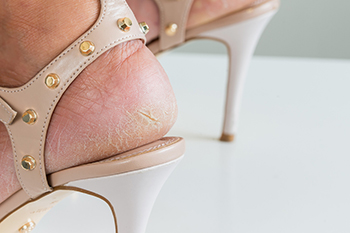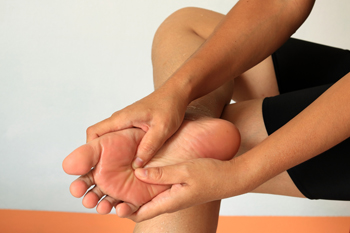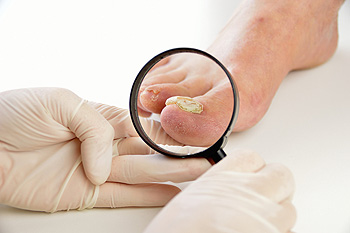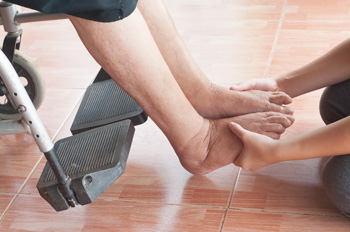 Dry, cracked skin on the heels can be frustrating, unsightly, painful, and irritating. Cracked heels may be caused by dehydration of the skin, extreme weather, wearing open-backed shoes, or medical conditions such as eczema and athlete’s foot. Cracked heels can be prevented by avoiding exposure to very hot or cold weather and wearing appropriate footwear that protects your feet. When bathing, it is suggested to avoid using very hot water and soaps with drying ingredients, such as sodium lauryl sulfate and artificial fragrances. Moisturizing your feet regularly can help reduce dryness as well. If you have dry, cracked heels that are embarrassing or causing you pain or discomfort, it is recommended that you consult with a chiropodist for treatment.
Dry, cracked skin on the heels can be frustrating, unsightly, painful, and irritating. Cracked heels may be caused by dehydration of the skin, extreme weather, wearing open-backed shoes, or medical conditions such as eczema and athlete’s foot. Cracked heels can be prevented by avoiding exposure to very hot or cold weather and wearing appropriate footwear that protects your feet. When bathing, it is suggested to avoid using very hot water and soaps with drying ingredients, such as sodium lauryl sulfate and artificial fragrances. Moisturizing your feet regularly can help reduce dryness as well. If you have dry, cracked heels that are embarrassing or causing you pain or discomfort, it is recommended that you consult with a chiropodist for treatment.
Cracked heels, also known as heel fissures, can cause pain and discomfort. If your cracked heels are bothering you, please consult with one of the chiropodists from The Footcare Centre. Our chiropodists will assess your condition and provide you with quality foot and ankle treatment.
Dry, thickened skin around the rim of the heel is typically the first sign of cracked heels. While this condition is common and usually just a nuisance, some cases can be more severe. If left untreated and as more pressure is placed on the heel, the cracks become deeper and eventually walking and standing can be painful. These deep cracks or fissures can bleed and also become infected. Those with diabetes need to be especially careful as fissures could lead to diabetic foot ulcers.
Causes
Cracked heels can be the result of several different factors, including:
Dry skin
Taking long, hot showers or using harsh soaps
Standing for long periods of time
Walking barefoot
Walking in shoes with an open back, such as sandals or flip flops
Wearing shoes that do not fit properly
Living in a cold or dry climate
Certain skin conditions, such as eczema or psoriasis
Treatment
There are many at-home treatment remedies for cracked heels. Applying moisturizers to the heel can help hydrate the skin. Soaking your feet in warm water and exfoliating them with a loofah or pumice stone can help to buff away dead skin cells. If you are afflicted with cracked heels, it is recommended that you see a chiropodist for treatment.
Prevention
You can prevent cracked heels by:
Avoiding standing in one position for prolonged periods of time
Wearing well-fitted shoes with a closed back
Washing your feet with gentle soaps and lukewarm water
Moisturizing the feet daily
If you have any questions, please feel free to contact our office located in . We offer the newest diagnostic and treatment technologies for all your foot care needs.




 Caring for our feet
Caring for our feet